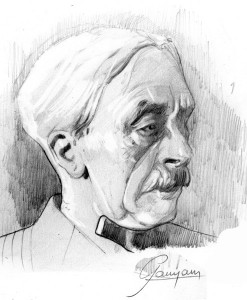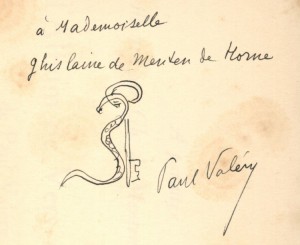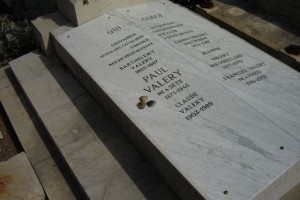Poetry in Translation (CXXXIII): Paul Valéry, (1871 – 1945 Sète, France) – “Les Pas”, “Paşii tăi -”
Paul Valéry
(1871, Sète – 1945, Paris)
Les pas
Tes pas, enfants de mon silence,
Saintement, lentement placés,
Vers le lit de ma vigilance
Procèdent muets et glacés.
Personne pure, ombre divine,
Qu’ils sont doux, tes pas retenus !
Dieux !… tous les dons que je devine
Viennent à moi sur ces pieds nus !
Si, de tes lèvres avancées,
Tu prépares pour l’apaiser,
A l’habitant de mes pensées
La nourriture d’un baiser,
Ne hâte pas cet acte tendre,
Douceur d’être et de n’être pas,
Car j’ai vécu de vous attendre,
Et mon coeur n’était que vos pas.
Paul Valéry
(1871, Sète – 1945, Paris)
Paşii tăi
Copii ai sufletului meu,
Sunt paşii tăi, mergând neobosit
Mereu prin ale soartei văi.
Cu trupul îngheţat şi trist.
Tu înger cu priviri divine!
Ce minunat e pasul tău mărunt
Aceste haruri ce ghicesc în tine!
Întreaga fiinţă mi-o pătrund.
Şi dacă zâmbetu-ţi serafic,
Este menit să mă aline
Doar sufletul îmi e ostatec
Sărutului ce se cuvine.
Nu te grăbi, adast-o clipă-n plus –
Fiind, sau poate ne-fiind,
Căci am trăit cu dorul de nespus
Ecoul tău în inimă bătând..
(Rendered in Romanian
by Constantin ROMAN, London,
© 2012, Copyright Constantin ROMAN)
Paul Valery –Biographical Note
abridged from Wikipedia and from poets.org:
Ambroise-Paul-Toussaint-Jules Valéry was a French poet, essayist, and philosopher. Valéry was born to a Corsican father and Genoese-Istrian mother in Sète, a town on the Mediterranean coast of the Hérault, but he was raised in Montpellier.
His interests were sufficiently broad that he can be classified as a polymath. In addition to his poetry and fiction (drama and dialogues) and aphorisms on art, history, letters, music, and current events. In addition to his poetry and fiction (drama and dialogues) and aphorisms on art, history, letters, music, and current events. After his election to the Académie française in 1925, Valéry became a tireless public speaker and intellectual figure in French society, touring Europe and giving lectures on cultural and social issues as well as assuming a number of official positions eagerly offered to him by an admiring French nation. He represented France on cultural matters at the League of Nations, and he served on several of its committees. The Outlook for Intelligence (1989) contains English translations of a dozen essays resulting from these activities. Valéry is currently considered a touchstone for those interested in constructivist epistemology, for instance, in Jean-Louis Le Moigne’s description of constructivist history. Valéry died in Paris in 1945 and was given a state funeral. He is buried in the cemetery of his native town, Sète, the same cemetery celebrated in his famous poem, le Cimetière marin.
Valéry’s technique is quite orthodox in its essentials. His verse rhymes and scans in conventional ways, and it has much in common with the work of Mallarmé. His poem, Palme, inspired James Merrill’s celebrated 1974 poem Lost in Translation, and his cerebral lyricism also influenced the American poet, Edgar Bowers.
In 1931, he founded the Collège International de Cannes, a private institution teaching French language and civilization. The College is still operating today, offering professional courses for native speakers (for educational certification, law and business) as well as courses for foreign students.
He gave the keynote address at the 1932 German national celebration of the 100th anniversary of the death of Johann Wolfgang von Goethe. This was a fitting choice, as Valéry shared Goethe’s fascination with science (specifically, biology and optics).
Along with Paul Verlaine and Stéphane Mallarmé, Valéry is considered one the most important Symbolist writers. His highly self-conscious and philosophical style can also been seen to influence later English-language writers such T. S. Eliot and John Ashbery. As a critic and theorist of language, his work was important to many of the structuralist critics of the 1960s and 1970s.





No Comments so far ↓
Like gas stations in rural Texas after 10 pm, comments are closed.